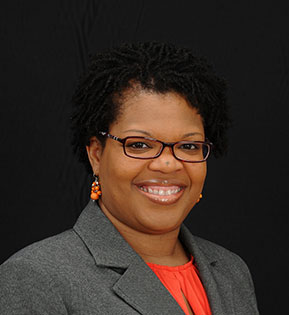
Chanequa Walker-Barnes received a 2011 First Book Grant for Minority Scholars award for her project Too Heavy a Yoke: Black Women and the Burden of Strength. Chanequa shares about her book Too Heavy a Yoke: Black Women and the Burden of Strength (Cascade Books, 2014).
LI: Tell us about yourself and your current work.
CW-B: I am an assistant professor of pastoral care and counseling at McAfee School of Theology at Mercer University in Atlanta, Georgia. I get to spend my days shaping the future leaders of the church, preparing and equipping them to provide competent and effective pastoral care. Most of my classes involve a focus on race and gender issues. Since the publication of Too Heavy a Yoke, I have turned my attention to a book project focusing on racial reconciliation. I am very interested in how womanist theology can broaden our theology and practice of racial reconciliation, which has been an evangelical and male-dominated subject.
LI: What core question/concern guided your research project?
CW-B: My main objective in Too Heavy a Yoke was to question an assumption that often goes uninterrogated in American culture: the assumption of Black women’s strength. People often describe Black women as strong. But what does that strength look like? Why is being perceived as strong so important to Black women? And what is the role of the church in shaping Black women’s identities?
What would you like us to know about your book Too Heavy a Yoke: Black Women and the Burden of Strength?
CW-B: With Too Heavy a Yoke, I wanted to blur the lines: the lines between disciplines; the lines between the church and the academy; the lines between sacred and secular. This book began as a personal odyssey when I recognized that being a “Strong Black Woman” was posing a serious hazard to my health. It morphed into a pastoral concern when I began to see the same pattern in the women in my local church and in my psychotherapy practice. It was a few years before I began to think of it as an academic research project.
I also wanted to bridge together different disciplinary voices that had been writing on this: not just theology, but also cultural studies, psychology, sociology, and public health. It made for a challenging process as I had to do a lot of code-switching to read and write across disciplines. But there were a lot of fun moments as well! I got to watch ten seasons of Grey’s Anatomy in one summer so that I could write about how the character of Miranda Bailey embodies the “Strong Black Woman.”
My hope is that by blurring the lines, I have managed to craft a book that meets the standards of academic rigor, but that does so in a way that remains accessible and useful for the church – for pastoral caregivers who minister to African American women and for women who find themselves staggering under the burden of the “Strong Black Woman.” Through my research, I have been convinced that this cultural myth is one of the biggest barriers to physical and socio-emotional well-being for African American women. I believe that the church bears some of the responsibility for that. And I also believe that the church has tremendous resources for liberating Black women from the burden of strength. My hope is that Too Heavy a Yoke reminds the church of its liberating power.